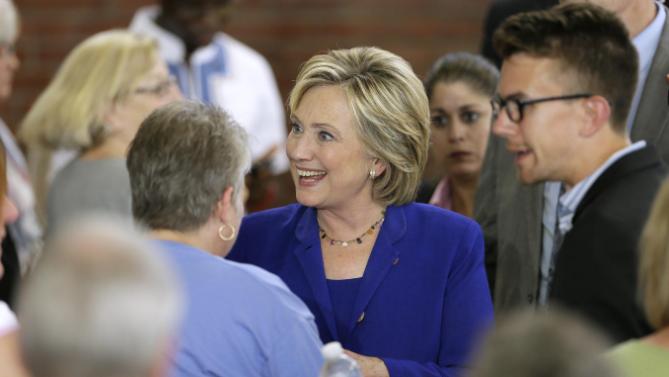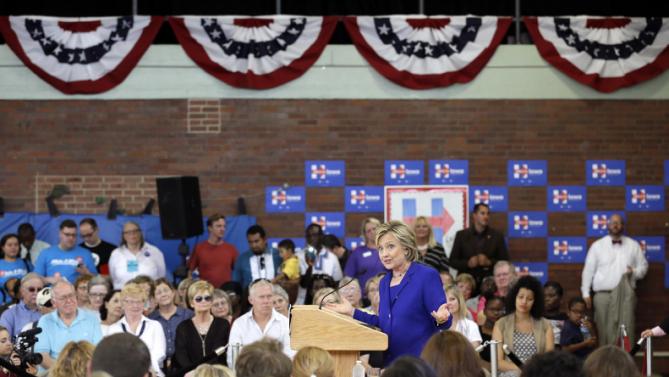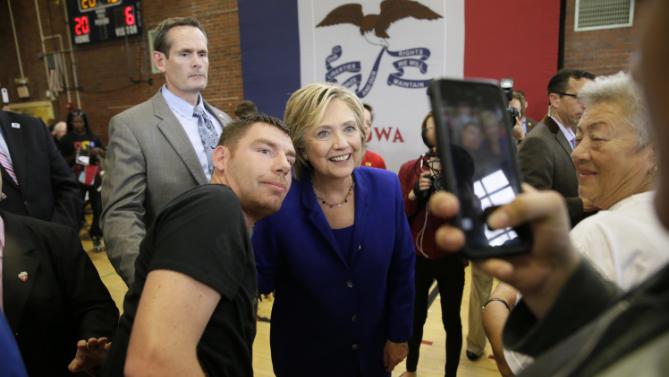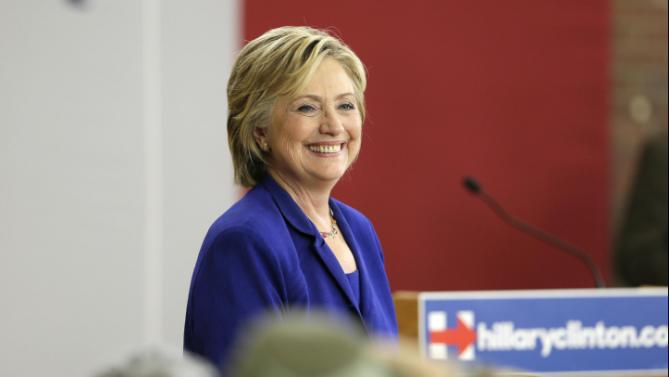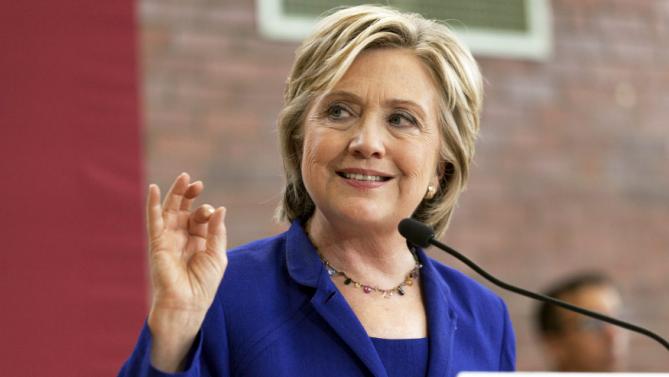At
a community event in Des Moines, Iowa, Hillary shared her vision for
how we can make the Affordable Care Act work for all Americans by
bringing down out-of-pocket health care costs.
I'm delighted
to be here. I want to thank Dionna for introducing me and congratulate
her for now being a member of the Des Moines school board.
I want to also thank Eric Van Dorin, the principal of Moulton Elementary School, who is hosting us here, and his family.
I want to recognize Attorney General Tom Miller. Thank you so much for being here, Attorney General.
And we're in the district of Ako Abdul-Samad, state representative. Thank you so much.
And
we have a number of other elected officials here from Des Moines, from
Pope County, and indeed from other places in the state.
I want to
start by making some remarks, and then I want to have a chance to take
questions, because I hope we will be able to cover one of the issues
that I will start with that is so important about the rising cost of
drugs, and we'll be able to get to other questions that you have.
You
know, I started this campaign with the firm conviction that we needed
once again to renew the basic bargain in America. We needed to tell
people and deliver on the promise that if you work hard and you do your
part, you should be able to get ahead and stay ahead.
And for me I
am very grateful that we came out of the worst financial crisis since
the Great Depression. I think the extraordinary burdens that families
had to deal with, many of you went through it, combined with the
leadership of President Obama, who does not get enough credit for
getting us out of that financial ditch we were in, really puts us in a
good position for the future, as long as we make the right decision
about who should be in the White House come January 2017.
You
know, corporate profits are near record highs, but most paychecks have
barely budged. Costs for everything from child care to college are
rising faster than wages.
So the centerpiece of my economic plan
is to get incomes rising again, get more money in your paychecks, give
the middle class a raise so that you can get back to planning for the
future and providing for your children. So I'm laying out my approach
toward this. And some of you I know, I've talked with, you've been
following it.
But I also want you to know that I'm going to pay
attention to those problems that also keep you up at night, the kinds of
problems you talk about around the kitchen table.
As I've
traveled across Iowa, I've heard from veterans who aren't getting the
health care they need and whose buddies aren't either.
I've heard from teachers whose students come to school hungry, and don't really have the attention to be able to learn.
I've
heard from grandmothers whose own children are struggling with drug
addiction, so they're taking care of their grandchildren.
A few
days ago in New Hampshire, I spoke with a man whose mother has
Alzheimer's. He can't afford a full-time caregiver. He has to work. He
doesn't know what to do. So I'll tell you what he does, he brings his
84-year-old mother to work with him so he can keep an eye on her.
These
are the kinds of challenges that people are talking to me about. So I
want to be the president who takes on those big issues in the headlines,
what are we going to do about Syrian refugees, what are we going to do
about climate change—we've got to get busy combating it—what are we
going to do about the kind of challenges we face around the globe, but
also those quieter problems.
And one area that I've heard so much about is what we will do to make sure that the Affordable Care Act works for everybody.
You
may remember that when I was First Lady, I fought for health care
reform. I believed then what I believe now, that every American deserves
quality, affordable health care. It can mean the difference between a
family being financially secure or going bankrupt. It can also literally
be the difference between life and death.
And, you know, health
care is a huge part of our economy. So we want to make sure that it's
helping us grow, not holding us back.
The health care battles of
the '90s were pretty brutal. At their time, the insurance companies and
their allies in Congress blocked us from making the kind of
comprehensive reform America needed.
But we kept at it. I worked
with leaders on both sides of the aisle to create the Children's Health
Insurance Program that now covers 8 million children across the country,
who get health care they need and deserve.
And I was thrilled to be a member of President Obama's administration when he signed the Affordable Care Act into law.
And
I am convinced that we are seeing the results. For the first time in 50
years, the rate of uninsured Americans has fallen below 10 percent. As
of today, we know nearly 18 million people have gotten health insurance
through the Affordable Care Act. And despite what you hear from the
other side of the aisle, it has not bankrupted America. In fact, it is
saving us money. Overall health care costs are going down.
But,
you know, despite all the evidence, every single Republican candidate
for President has vowed that, if elected, they'd get rid of the
Affordable Care Act. And Republicans in Congress have already tried to
do that. They have voted 54 times to repeal the Affordable Care Act.
I
love it, because it reminds me of that old quote, you know, the
definition of insanity is doing the same thing over and over again and
expecting a different result. Well, apparently they're going to keep
voting to repeal it. They're living in what I like to call an
"evidence-free zone." It doesn't matter what the facts are, they are
partisan ideologues, and they're going to keep trying to tear it up and
force us back into a debate about health care.
Well, politics can
be, unfortunately, a pretty cynical business, but this really goes
further than I can tolerate. I don't know what they would say to all the
people who have benefited from the Affordable Care Act. It's given
millions of families peace of mind. It protects millions of people with
pre-existing conditions. It says women cannot be charged more for health
care just because we are women. And it lets young people stay on your
parents' plans until the age of 26, so that you can get the health care
you need. And I particularly love that it's given access to so many
Americans access to life-saving preventive care like mammograms and
vaccinations and blood pressure screenings.
So the Republicans are
just dead set on repealing it. And besides, they never will tell you
what they would do. So I believe we can basically discount what they say
about the Affordable Care Act or about health care. They've even said
they want to "phase out" Medicare. Imagine that. Well, I can tell you I
will never let anyone phase out Medicare, and I will defend the
Affordable Care Act.
But as president I want to go further. I want
to strengthen the Affordable Care Act, because the truth is, it
couldn't and it didn't solve all of our problems. Yes, the uninsured
rate is the lowest in decades, but the cost of prescription drugs went
up by over 12 percent last year. Now, your income I bet didn't go up by
over 12 percent. Meanwhile, other out-of-pocket costs are growing, too.
And the insurance companies just keep raising premiums.
So while
the overall growth in health care spending has slowed, and that's good
news for our economy. For a lot of families it doesn't feel like health
care costs are coming under control, because their own out-of-pocket
costs keep climbing and their wages aren't keeping up.
And that
puts a lot of pressure on the families that are talking to me. And it's
not like you can stop buying the medicine your child needs or skip an
appointment when you're really sick because you can't afford the co-pay.
You find the money, even if it means taking on more credit card debt,
or being late with other bills. And those aren't real solutions. So I
think we can do better.
I want us to take a really hard look about
the pieces of the Affordable Care Act that need improvement. I have a
plan to help families by bringing down the out-of-pocket health care
costs that I will be rolling out in the next few days.
Now, though, I want to talk with you about how we can rein in the cost of prescription drugs.
Let
me start by saying we live in a time of extraordinary breakthroughs in
the fight against disease, from rheumatoid arthritis to multiple
sclerosis to cancer. New drugs are making it possible for people to lead
healthy, pain-free lives.
And our pharmaceutical and
biotechnology industries deserve credit for that. They are helping save
lives and ensure that America remains the world's innovation superpower.
And I saw that firsthand as secretary of state. I saw what our
medicines meant for people living with diseases like HIV/AIDS. Helping
people to stay alive and become healthy is one of the ways America can
show who we are, what we stand for, what our values are.
But at
the same time, we need to protect hard-working Americans here at home
from excessive costs. Because too often, these drugs cost a fortune.
Now, sometimes, there is a good reason for that. Scientific
breakthroughs are often the result of major investments, both by
pharmaceutical companies and by your federal government. So it may make
sense for a short period of time to have to charge a lot of money for a
drug.
But when a drug has no competition, when there aren't any
other treatments that can do what it does, pharmaceutical companies can
charge astronomical fees, far beyond anything that it would take to
recoup their investment, and far beyond what they charge consumers
anywhere else in the world outside of America.
It has gotten to
the point where people are being asked to pay not just hundreds, but
thousands of dollars for a single pill. And I can tell you that is not
the way the market is supposed to work. That is bad actors making a
fortune off of people's misfortune.
Some of you may have read
about an egregious example of this that was in the news yesterday. A
drug that's been around for decades—it wasn't just invented with new
research and new dollars backing that up, it's been around for
decades—that went from costing $13.50 a pill to $750 a pill literally
overnight.
That's price gouging, pure and simple. And
pharmaceutical companies that acquire an existing, affordable drug that
people rely on it, and then turn around and charge a fortune for it just
bet on the fact that desperate people will find some way to pay for it.
At
the same time this is happening, top pharmaceutical companies are
receiving billions of dollars in tax relief every single year and
earning billions of dollar in profits every year. And many of them spend
more money on marketing and advertising than they do on research.
You've
seen the millions of ads on TV, right? They often show people being
really happy and running through fields of wildflowers, and if you take
this drug your life will be so much better. Meanwhile, they're telling
you it has this bad effect and that bad effect and be careful about this
and don't take it with that. But the visual image is so attractive. And
it's something that has bothered me for a long time.
Now, I know
that whenever anyone starts talking, as I have, about reforming
prescription drugs and their prices, some people worry that my proposals
will threaten innovation. But I have designed a plan that will do
exactly the opposite. I want to both protect consumers and promote
innovation, while putting an end to profiteering. We can achieve a
win-win for families, businesses, and America.
There are leaders
in the pharmaceutical and biotech industries who share my concerns about
high prices. They know we need to make some changes. They just want to
make sure it's done right, and so do I.
So under my plan, drug
companies who want to keep getting federal support will have to redirect
more of their profits into meaningful investments in research and
development. That'll mean more breakthroughs, more good drugs, not
fewer. The way I see it, if we, the American taxpayers, support your
company, you should be focused on delivering results that benefit us,
not just your shareholders and your executives.
And under my plan,
I will make sure that when new drugs are introduced, doctors,
businesses, and consumers can get clear answers about exactly how these
new drugs will improve upon existing treatments.
I fought for this
kind of transparency in the Senate, because here's the truth. Too
often, so-called "new" drugs are really old drugs that have just been
tweaked a little bit. But then they're marketed as breakthrough drugs,
and they're sold for high prices. Drug companies should have to explain
why their new drugs are different and better than treatments on the
market. Because I don't want any of us paying for some fancy new pill
that is no better than what's already available.
I also want to
tackle the direct-to-consumer advertising. I'm guessing that a lot of
you might be surprised, even shocked, to learn your taxpayer dollars are
actually helping pay for those ads. Other countries ban these ads
because they are so often misleading. But at the very least, we
shouldn't be encouraging them with corporate write-offs where you can
deduct the cost of marketing.
Under my plan, we will instead use
that taxpayer money to fund innovation. I'd rather see more treatment,
more cures, and way fewer ads, and I think a lot of us consumers feel
the same way.
I would also like to make sure any ads the drug
industry does run are approved by the FDA, so we will know they are
accurate and understandable to those consumers who are watching or
reading them.
Then there's Medicare. You know, the more than 40
million Americans enrolled in Medicare represent a huge market for the
drug companies. Therefore, I believe Medicare should be able to
negotiate for lower prices for its members. This would be like what the
VA now does. It's a basic feature of a free market. But you know it's
actually against the law now for Medicare to negotiate for lower prices.
And that makes no sense.
I have been fighting to change this law
for years, and as president, I will get it done. I will require drug
companies to provide higher rebates for prescription drugs to low-income
Medicare patients, just like they have to do for Medicaid patients.
That would save more than $100 billion in Medicare costs every year.
And
you know how the Republicans are always talking about how Social
Security is running out of money, and Medicare is running out of money?
Well, they way exaggerate it. Don't get all nervous about it. They love
to make it sound like it's going to happen tomorrow, with sort of
ghostly music.
Well, we do have to make sure the Medicare trust fund is solvent. This would add to that. It would be a win-win.
Because
what I see is if you get prescriptions or medicines that really help
you, it doesn't do you any good if you can't afford to fill them.
So
that's why also under my plan I will cap out-of-pocket drug costs for
working families. You won't have to pay more than $250 a month for
covered medications. And we know this can work, because several states
have already do it. I want to do this nationally so that we can keep the
costs down particularly for people who have a chronic illness.
Also
under my plan, you will be able to import cheaper drugs from other
countries legally. If the medicine you need costs less in Canada, you
should be able to buy it from Canada, or any country that meets our
safety standards.
You know, when I was privileged to represent New
York, you know, look at the map, upstate New York borders Canada. Every
week there would be buses of American seniors going over to Canada to
buy drugs that were American manufactured, drugs that were invented by
American companies, for a much cheaper price over the border. That makes
no sense at all, folks. And when I'm your president, you will be able
to do just that. Now, I don't want you to have to drive to Canada, so
you can order them online and get what you deserve to get.
I will
also be sure we have more generics on the market. That will increase
competition and give doctors and patients more choices, and save you
money. Why don't we have more generics on the market? Well, one reason
is that the FDA's Office of Generic Drugs has a huge backlog. Well, I'm
going to give them the funding and the personnel to clear that backlog,
and approve dozens of generic versions of expensive drugs. That's easy
to do. We can get it done. I will save you money, it will help you with
your medical issues.
Now, we've also got to deal with other
out-of-pocket costs like deductibles, co-pays, co-insurance. According
to a report by the nonpartisan Kaiser Family Foundation that came out
just today, four out of five workers face an annual deductible, and the
average deductible has risen nearly 50 percent since 2009, and it is now
on average over $1,000.
As a result, millions of Americans are
having trouble paying their medical bills. Some of you may be in that
category or know somebody who is.
So even though we are successful as a nation in reining in costs, I want you to also have the benefit of that.
Why
is it not happening as much as it should? Because insurance companies
have been keeping the savings for themselves, and shifting more costs
onto families. My plan will address that. I think the insurance
companies need to be put on notice that they have to help people afford
the medical care they need, not make it increasingly expensive and
difficult to access.
So I'm excited because I think this would
really give so many families a real shot at being able to afford the
health care that you need.
And with my plan we're going to add on
to the good work that was done by the Affordable Care Act. And it's
really important that we work together on this. We can't let the
Republicans tear the progress away. If we're serious about raising
people's incomes, we have to bring down out-of-pocket costs. I'm sure in
this election you will see all kinds of ads about the out-of-pocket
costs for the Affordable Care Act, and the Republican solution will be
get rid of the Affordable Care Act. That would be a mistake. What we're
going to do is build on and improve the Affordable Care Act.
I'm
just going to keep doing what I've been doing for years, which is to
fight for affordable, quality health care for Americans.
Thank you all very much.


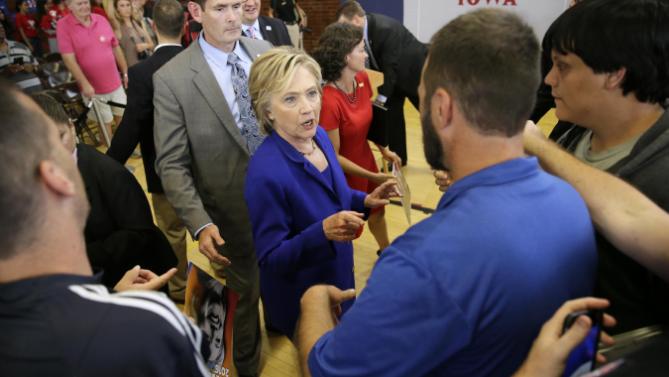


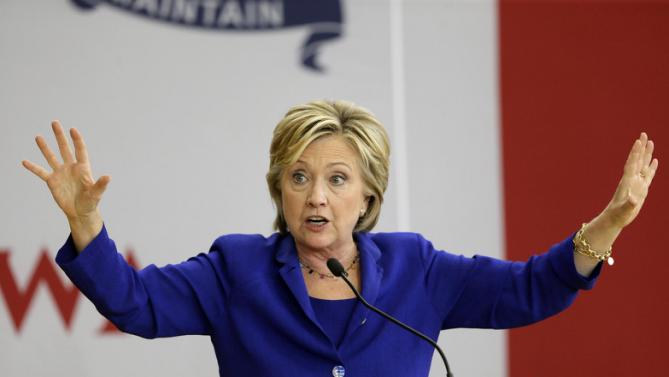


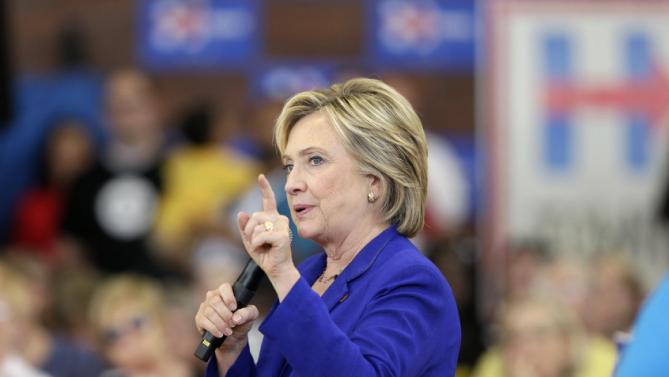
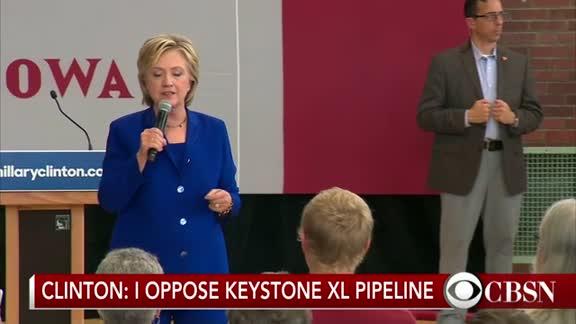

 Hillary Clinton
Hillary Clinton 
